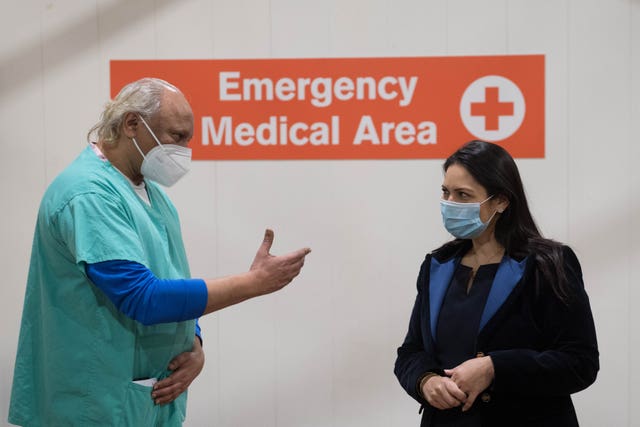
Clare Foges 6pm - 9pm
11 February 2021, 12:24

The Home Secretary has called on the likes of Facebook, Twitter and Google to do more to stop the spread of vaccine misinformation.
Priti Patel has told tech giants they have a social responsibility to take down anti-vaccination content and wider misinformation about the coronavirus pandemic.
The Home Secretary said platforms such as Facebook, Twitter and YouTube must do more to combat the spread of false claims online, particularly those linked to Covid-19 vaccines.
Speaking to the Times, Ms Patel said the platforms need to fact-check all posts to ensure that vulnerable people are not discouraged from getting a jab and putting themselves at risk.
“Social media (companies) have a social responsibility to make sure everything they put out on it and publish is factually correct,” she said.
“They should be working hard with us as well to pull down anything that is misleading, disinformation and misinformation.”
Ms Patel was speaking during a visit to a vaccination centre in north London as part of Government efforts to increase vaccine uptake among black, Asian and minority ethnic (BAME) groups.
Studies have shown that vaccine uptake is lower among these groups, which has caused growing concern among ministers and health experts.
The Home Secretary said social media companies should more actively promote information from official sources, such as the NHS, in an effort to curb the spread of conspiracy theories about the vaccine.

“Information that comes straight out of the NHS is still the most trusted information source about the vaccine, which is great,” she said.
“So I’d say to social media companies ‘Do your own bit, take responsibility, pull down misinformation and disinformation’, and there’s no harm in them actually linking a lot of their stuff to the NHS and gov.uk.
“Our messaging is absolutely crystal clear about the vaccines and about the coronavirus and getting information out to communities as well.”
Last year, in the early weeks of the pandemic, platforms such as Facebook, Twitter and YouTube introduced features which directed users to official sources of health information, including the NHS and the World Health Organisation (WHO) when they searched for topics linked to Covid-19.
Search engines like Google also created information centres containing the latest news on the pandemic from trusted sources, as well as linking to further guidance and other information on the topic.
We're running the largest worldwide campaign to promote authoritative information about COVID-19 vaccines. https://t.co/AVD44IGaWn
— Facebook Newsroom (@fbnewsroom) February 8, 2021
Earlier this week, Facebook also introduced a new tool to its Covid-19 Information Centre which helps people to find out where and when they can get vaccinated, including links to the NHS website.
Facebook has said it is the largest worldwide campaign promoting authoritative Covid-19 vaccine information.
In a statement, a Facebook spokesman said: “We remove harmful misinformation about Covid-19 and the vaccines, and between March and October we removed more than 12 million pieces of such content from our platforms.
“We’ve also directed more than 10 million visits to the NHS and government websites with authoritative information on Covid-19 and the vaccines.”